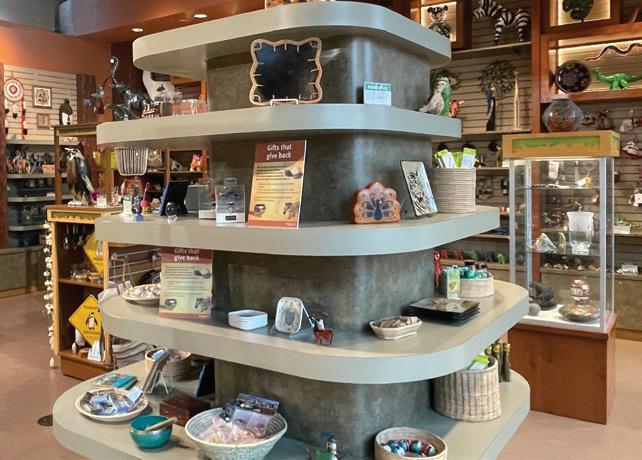
9 minute read
difference
Retailers in tourist destinations are always sourcing new and unique items for shoppers. Increasingly shoppers are drawn to items they know have positive impacts on the people who created them and the communities where those artisans reside. Fair trade and ethically produced goods are plentiful, and retailers who carry them can show they care and provide another reason for their customers to make purchases they know support humanitarian causes.
The Saint Louis Zoo has exemplified this mission in the products it carries at its gift store. Tommy Brown, retail manag- er, buyer of conservation goods and Zoo, Aquarium and Garden Buyers Group (ZAG) Board of Directors member, shares more about the zoo’s buying strategy and advice for other retailers in a Q&A with SeasideRetailer
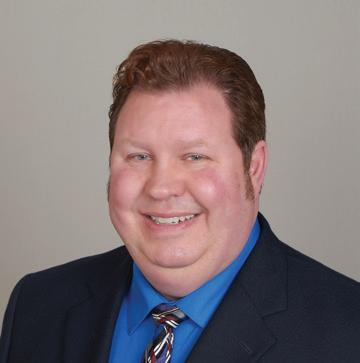
SeasideRetailer: Why is carrying fair trade or ethically produced products important for Saint Louis Zoo’s gift shops?
Tommy Brown: “People Matter” is one of our three keys at the Saint Louis Zoo, and we take this very seriously. People have to always be a part of conservation. We cannot help animals with-
Tommy Brown is the retail manager, and buyer of conservation goods for the Saint Louis Zoo. He has consulted for museums, attractions, theme parks and zoos worldwide. He currently serves on the board of the Zoo, Aquarium, and Gardens Buyer’s Group (ZAG). He has several published works in the industry, has received many awards in retail and education and has delivered numerous talks on retail, merchandising, conservation and sustainability. Reach him at TBrown@stlzoo.org.
Paper with a poo-pose
When Dr. Karl Wald traveled to Sri Lanka, he discovered that elephants were being killed because they destroy agriculture.
He and his friend, Thusitha Ranasinghe, created Mr. Ellie Pooh, a company that sells elephant dung paper to give the elephant an economical purpose, so people do not kill them.
The Fair Trade Federation member company partners with farmers and craftspeople in developing countries who are socially and economically marginalized. The company finds markets and customers for these craftspeople’s gifts.
“Mr. Ellie Pooh is about more than just paying a fair wage,” the company notes. “Our company has fostered relationships with every artisan group we work with. In most cases, they tell us what a fair price for items is.” out helping people.
Visit www.mrelliepooh.com.
Anthropological conservation is very important to us as well. This looks at culture, commerce and conservation in one paradigm. We want people who live around the animals in our collection to share their art and culture through crafts and goods.
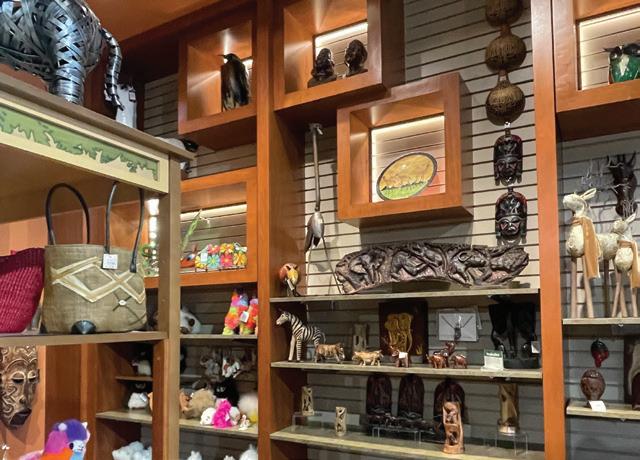
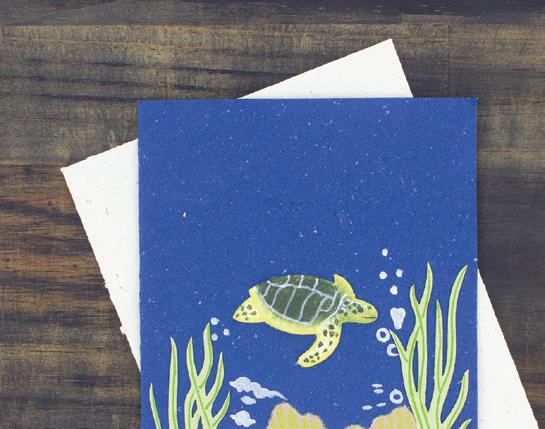
We are all human, and we all have wonderful stories. Sharing stories is what makes us human, and we have products from over 25 countries; so that makes for a lot of storytelling. You can go to almost any store and purchase something massproduced in a factory, but at the Saint Louis Zoo, a person can get a one-of-akind handmade craft that impacts the lives of others directly.
SR: How do customers respond to these types of products?
TB: Our guests respond very well to these products. People love the uniqueness of these handcrafted items, as most are not readily available in the marketplace. We work directly with many of our crafters in product development.
On a mission
When we were in Kenya, we developed a cell phone holder made of stone. We have to constantly think about new designs or ideas to stay relevant in the world of today. When people come in the gift shops they are not looking for a butter-churn, but they may need a handmade hair tie. Always keep the crafts relevant to the era you are living within, unless it is just a true decorative piece.
SR: How can a retailer determine if a company they want to do business with is a fair trade company?
TB: Fair Trade can be looked at in many ways. These are a few things we look for: 1) Are the people given a fair wage for their area of the world? 2) How are the people treated? 3) Is food provided around sustainable mining operations as not to decimate the environment around the mine? 4) Are the products destroying ecosystems or animal habitats? We have to be fair for the environment as well. 5) Are ethics, diversity and inclusion being considered when selecting a company? 6) Are they improving the lives of people without destroying their culture? 7) Ask if they support any conservation efforts with the funds they make within their company. 8) As a buyer, research the company and never take anything at face value.
ShoreBags’ mission is to produce functional and fashionable bags and accessories that reflect an active, outdoor lifestyle while sustaining an ethical production environment.
Transparent and ethical sourcing and manufacturing practices are ShoreBags’s central values. “We believe that great products are created with sustainability at their core, starting with the earliest stage of the product lifecycle,” the company states.
ShoreBags partners with third-party suppliers that provide safe, fair and healthy working conditions for the women and men they employ, according to the company. Its sustainability mindset extends to its vendors, who responsibly source raw cotton and other materials.
The canvas used is produced from cotton spun into coarse yarn, which uses postindustrial cotton waste collected during the process of weaving and spinning. Cotton is sustainable, renewable and biodegradable, making it an excellent choice as an environmentally friendly fiber. It does not require excessive amounts of water, is drought-resistant and grows easily without pesticides or herbicides, the company notes. Visit www.shorebags.com.
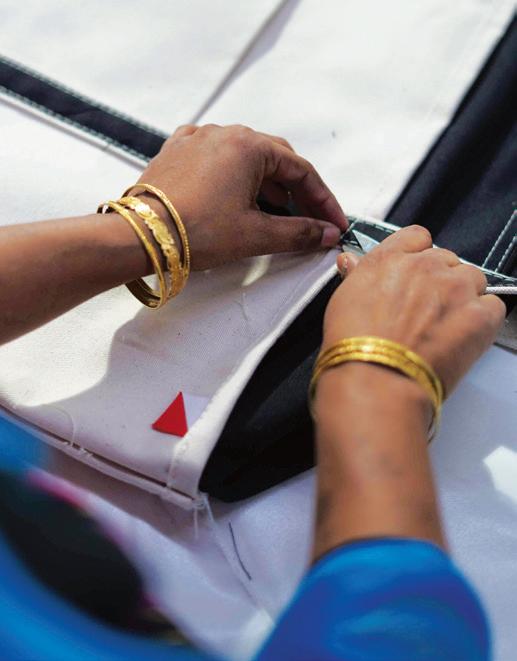
Research is very important because you want to ensure you are telling the correct stories to your guests.
SR: What does it mean to be certified fair trade versus simply doing business fairly? Are both okay? Are there companies making claims that aren’t substantiated?
TB: There are a few certification organizations out there in the industry that ensure products measure to a certain standard. Do not limit yourself to only certified fair trade companies. If you know the company and have done research on the company, then it is up to you as the buyer to make the call on whether or not to buy from them.
Breaking the cycle of poverty in Nicaragua
Liz Thomson and Jerry Wang founded Nica Life to create fair trade jobs and opportunity in underserved areas of Nicaragua.
“At Nica Life, we believe that to break the cycle of poverty, women must have access to both a living wage and education. We are committed to paying living wages and funding education and development programs for all our artisans,” says Thomson.
Nica Life joined the Fair Trade Federation in 2019 “because we wanted our shoppers to have the comfort of an outside organization verifying our fair trade practices,” says Thomson.
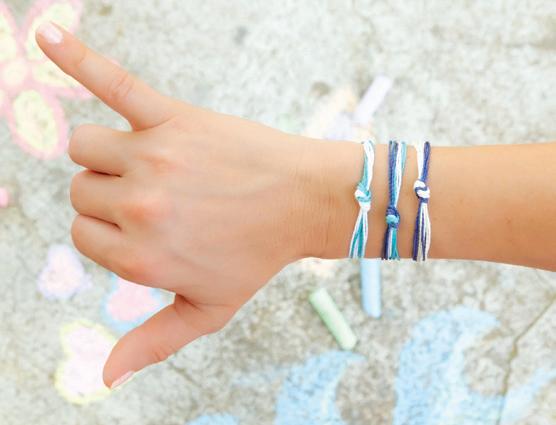
By understanding living wages and paying accordingly, paying as soon as the jewelry is made, allowing artisans to make their own schedules and work at home while caring for their children, as well as transparency in who made each piece by including artisan signatures on the tags and cards is all part of how Nica Life embodies fair trade practices in its business.
“We follow U.S. trends and design products that shoppers love, and our story makes them feel great about their purchase,” says Thomson. Visit www.nicalifeproject.com.
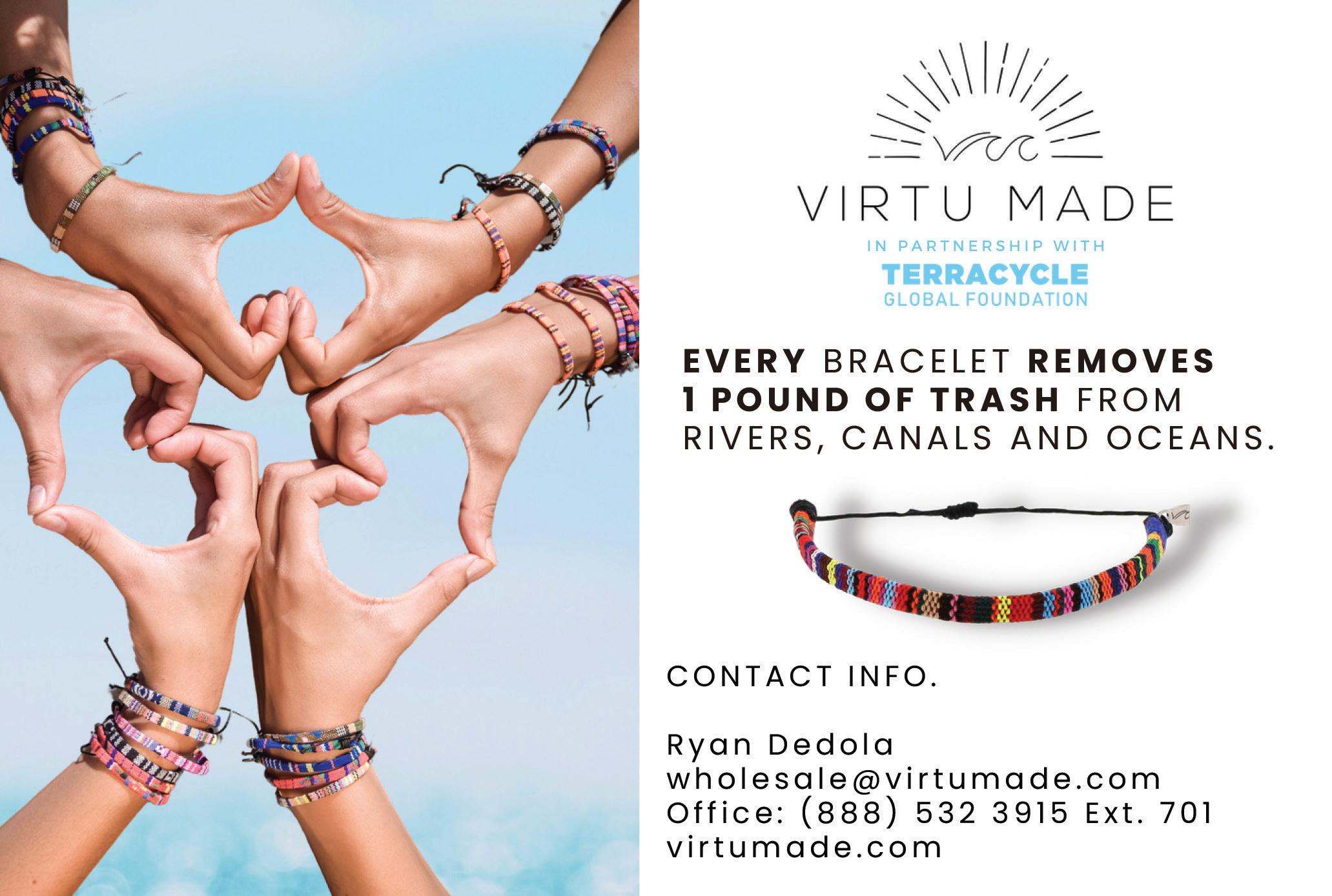
Empowering artisan communities
While traveling through Asia, Lotus and Luna founder Janelle Clasby fell in love with Thailand.
The kindness of the Thai people inspired her to start a business that would alleviate the daily stress of living in poverty.
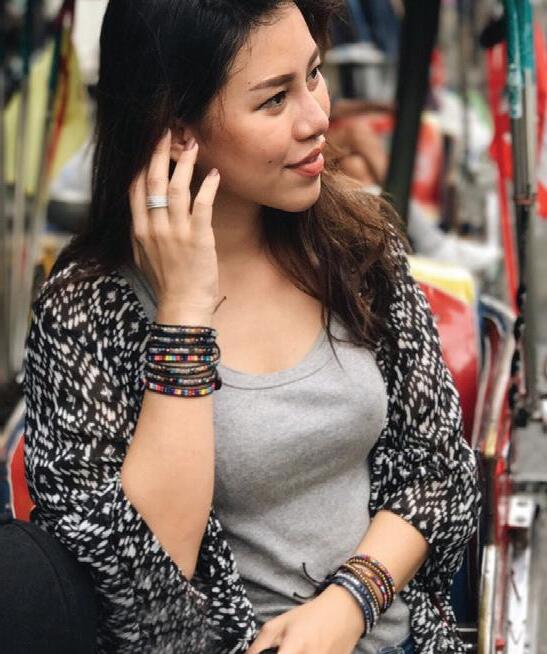
After meeting artisans Wilawan, Rung and Watini, she was determined to create a consistent job for these talented women and pay them fairly for their high-quality work.
Starting with just three artisans, Lotus and Luna has grown to employ over 300.
Lotus and Luna empowers artisan communities through educational resources, fair wages and endless opportunities.
The company’s unique, handcrafted products promote growth among villages in Thailand, helping them achieve a better quality of life.
“We are proud to spread the importance of ethical consumption by sharing their talents with the world,” the company says.
It’s popular harem pants and other products, homemade in Thailand, come with a photo and story of the artisan who created them.
At the root of Lotus and Luna’s core is a desire to protect its commitment to empowering Thai artisans and their communities. Visit www.lotusandluna.com.
It is you and your facility’s reputation on the line. Always remember this when you buy anything. Will you make mistakes along the way? Yes, but admit your mistake and be fully transparent of the misinformation. We are only human and trying our best to help other humans through fair trade practices. As long as your buying intentions are good, that is the most important thing to remember.
SR: Where can one go to find fair trade products to carry in their store? Where do you go?
TB: We carry “fair trade” in these categories: stone sculptures, baskets, wood carvings, beaded items, tea, spices, coffee, wall art, paintings, jewelry and recycled/ upcycled.
These products can be found at some Clarion Events shows, Emerald shows, Las Vegas Market, AmericasMart and other regional shows. If your institution has the finances, I suggest going into the field to find your own crafters and use existing vendors to help you get their products into the country legally. Never just bring products back in your suitcase, as I have heard of some buyers doing in the past. Products need to always enter our nation legally because there can be economic and environmental risks.
SR: Why should a seaside retailer consider carrying fair trade products?
TB: We have but one world, and it
A virtuous idea
should be considered in every profitand-loss statement. Ensuring sustainability for the future is a must, not an option. For years, most companies used the earth and just took from it without considering the ramifications for the future. Our generation is just starting to see the effects of this abuse, and we need to take action now as companies and shoppers to slow the destruction of our planet. When doing any kind of business consider the “green” bottom line. The green bottom line consists of the three pillars of sustainability: economic, environmental and social. All three of these pillars must reside in a state of homeostasis in order to help mend the world.
Remember this: You are of the earth, not from the earth. Think about this phrase next time you are making purchasing decisions. Think about if the product you are buying is helping or destroying your world? Think about your purchase; is it lifting someone out of poverty or enslaving an innocent human? Is what you are doing in your business helping build up the people in your community or is it causing an unhoused concern? These are the reasons why everyone should consider carrying fairly traded products in their locations.
SR: What approach should a retailer take when introducing fair trade items into their store/displays?
TB: Start with a sampling of different fairly traded products and test the sales.
VirtuMade, a brand whose products symbolize the harmony between humankind and nature, recently joined forces with TerraCycle Global Foundation to remove and recycle 1 pound of trash from rivers, canals and oceans for every product sold.
Eric and Ryan Dedola founded VirtuMade in the 2010s after traveling the world. They were fascinated by the diversity of cultures, art and natural beauty. Through their journey, they met artisans in Guatemala, Bali and Turks and Caicos and began working with them to promote their crafts.
In conjunction with the partnership, VirtuMade has launched a new line of bracelets made out of colorful textiles by artisans in Bali that feature a stainless steel charm with VirtuMade’s logo. The V and M resemble waves. The company also sells throw blankets that are handcrafted in Africa, along with other artisan-made wooden chimes and jewelry. Visit www.virtumade.com.
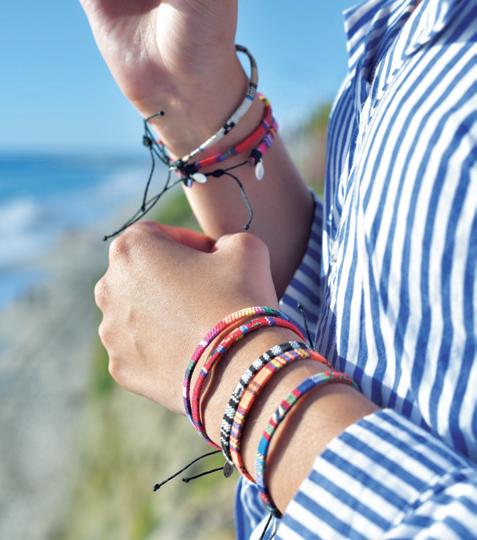
Yes, we all want to help people and the planet, but if the items just sit on your shelves, it helps no one. Once you find the correct conservation minded products, bring them in and feature them with a story. Share these stories through conversations, videos or signs.
It is also important to know your area, and what is important to them in terms of fair trade products. Maybe your area has a focus on saving sea turtles. If that is the case, you should find a hand-crafted product that uses sustainable, natural materials and gives money back to sea turtles.


Have fun, learn about fair traded items and do your best to help sustainability within your shop. This article is just a tip of a very large iceberg. It is now up to you to go do all the research and find what works for you and your shop. On a good note, we have the internet now, and that makes things much easier to find. Best of luck on your sustainable journey!
Helping survivors
Noble Venture curates fashion accessories and products from organizations around the world. For more than 10 years, Noble Venture has provided employment opportunities, awareness initiatives and funding to support organizations in the fight against human trafficking through the sale of products made by human trafficking survivors and those in at-risk communities. Selected artisan partners in at-risk communities have created thousands of beautiful, handcrafted products that are sold and distributed under the label Noble Venture, providing sustainable jobs, independence and hope for a future of those impacted by trafficking in their communities. At Noble Venture, artisan groups sell their products on its website and through wholesale outlets, providing fundraising support and awareness around the issue and their products.
Although not a certified fair-trade company, it’s application and interview process is built upon fair-trade standards and expectations, including ensuring opportunities for economically disadvantaged communities, safe and empowering working conditions, child rights and safety, environmental stewardship, cultural identity and fair wages. Visit www.noble-venture.com.
STORY BY MARY ELIZABETH WILLIAMS-VILLANO










